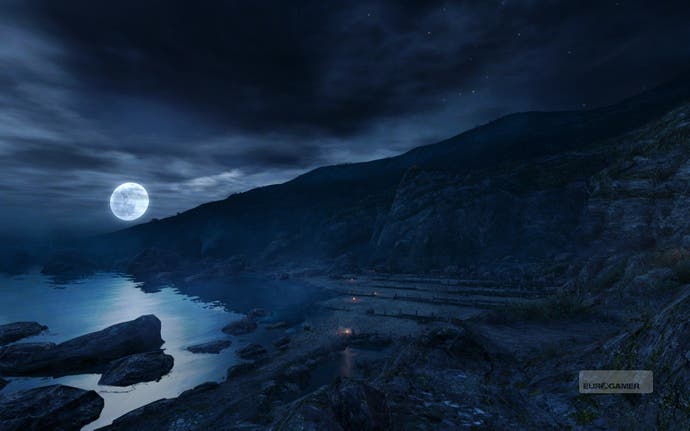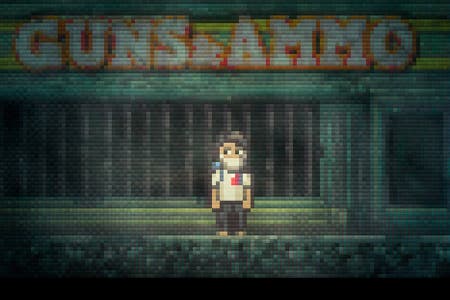Game of the Week: Lone Survivor
Alone in the dark.
I've just ordered the parts for a new PC. I'm very excited. My current computer, while it can still just about play new games, has passed the point where the experience is any fun at all. A hand-me-down graphics card from Rich Leadbetter which won't fit in my current case was all the excuse I needed to start from scratch.
While not quite cutting-edge, the new machine should be more than capable of tackling all those fancy first-person shooters I don't really want to play, and absurdly overpowered when it comes to what I'm actually going to use it for: playing Diablo 3 and indie games.
You can keep your mobile app stores - if you ask me, the PC indie scene is the most vital and exciting sphere of the games business right now. Gaming-capable PC hardware is ubiquitous across the first and even large parts of the second world, and internet connections are a given, putting a gigantic global audience within easy reach of every developer and inflating even the most obscure, specialist niche to commercially viable size.
It's almost a return to the days when Doom was installed on more computers than Windows. Several games that can claim to be among the biggest in the world today - Minecraft, League of Legends, World of Tanks - were made entirely outside the traditional publishing ecosystem. In this world, projects from the outer reaches of left field, like the arty Dear Esther or retro Legend of Grimrock, can become bona-fide overnight hits.

For would-be game-makers, the barrier to entry is just as low as it is on smartphones and tablets, but the possibilities are so much broader - if for no other reason than the range of human interfaces available. And Valve's Steam offers consumers the convenience, reliability and integration of a closed platform with community and marketing features that ought to make Apple and Google green with envy. Hell, it even lets the swelling ranks of Mac users in on the act - an opportunity that indie developers have been quick to exploit (unlike their slow-moving commercial brethren, as Rob Fahey pointed out on GI last week).
Thrilling stuff! There's just one problem for me, the reviews editor of a multi-format gaming publication. This scene operates largely on word of mouth rather than traditional promotional channels, with few developers having a grasp on PR (or the budget for it). Consequently, there's a good chance that by the time I've heard about a game and can get round to commissioning and scheduling a review of it, you guys are already playing it.
We featured a number of indie PC games this week, all of which were released between a week and a couple of months earlier. The reviews were still worth writing and publishing, of course, but they could have been a lot more useful to everyone - us, you, the developers - if they were more timely. It's my job to get better at tracking these games, so as to serve our readers and this sector of gaming better, and I very much hope to. But there's an extent to which it's always going to happen when there's an army of publisher PRs bearing down on me with the specific aim of attracting my attention to their wares.
Does it matter? Wouldn't submitting to the publicity treadmill distract indie developers from what they do best? Aren't they managing to sell good numbers of games regardless? Are gaming review sites like ours still relevant in today's socially networked world, where you can draw recommendations from your peers?
There's some truth to all of that, but gaming is such a crowded and noisy space that I think the media can still make a difference. The developers of Dear Esther hired occasional Eurogamer contributor and indie expert Lewis Denby to represent their game, and Lewis made sure that me and my colleagues had access to a review version before release, told us when the release date was, and advised when would be the best time to publish our reviews. The game then took only six hours to make a profit. I don't think these things are unrelated.
Promotion doesn't have to mean an expensive marketing campaign; something as simple as a well-organised release can make all the difference. Editors like me would be foolish to miss an opportunity to be part of this blossoming gaming scene, and developers would be foolish not to give us a helping hand.
Lone Survivor
When he's not actually being paid to promote a game, Lewis still helps out by pitching reviews to ignorant editors like yours truly - and that's what happened with Lone Survivor, a one-man-band survival horror production by Jasper Byrne.
The comments on the review were dominated by a debate over the game's retro pixel art, a common visual choice in indie development circles that some decried as a lazy, retrograde or "me-too" option. It's easy to understand a level of fatigue with this style, and it's true that it's often used as a shorthand for a whimsical, "they don't make 'em like they used to" brand of nostalgia which is both disingenuous and patently untrue.
It's a shame to see every indie pixel-art game tarred with that brush, though. Pixel art is a legitimate gaming idiom that it would be a terrible shame to lose entirely, and besides, good art is good art at the end of the day, no matter what style it's in. It can also be a lot more than an affectation: a game like Fez has pixel art at the core of its gameplay concept and technology, while Lone Survivor subtly exploits the tension between an old look and new ideas to do things that a modern graphic style couldn't.
"There is such a clear understanding of how to generate real fear," Lewis wrote. "Lone Survivor never once made me jump, nor did it especially disturb me, but I can't think of another game that's made my heart race quite so much upon opening a door. It achieves this primarily through some incredible sound design - scratchy, muffled and horrifically alien - but also through immaculate pacing, abject confusion, and some tremendous artistry crammed into the few pixels it possesses.
"It's true that Lone Survivor owes a lot to the atmosphere of early Silent Hill, and there are a few thematic nods to David Lynch's '90s weirdo drama, Twin Peaks. But beneath them lies an intricate and unique game that takes the best of old-style survival horror and warps it into something all of its own. It's brave, uncompromising, and a little bit knowing - and, crucially, it's got more than enough substance to back up its style."


